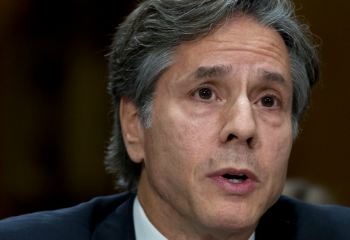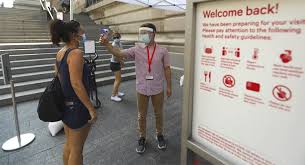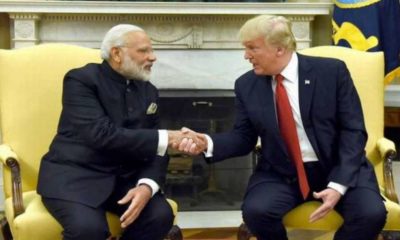World
Half of Muslim doctors in US feel discrimination

Washington: American Muslims, even those in one the most highly regarded professions in the US, encounter a less-than-inclusive and welcoming work environment during their career, a national survey has revealed.
The survey that comprised 255 US Muslim physicians found that nearly half of the respondents felt greater scrutiny at work compared to their peers.
Nearly one in four said workplace religious discrimination had taken place sometimes — or more — often during their career.
The same percentage of Muslim physicians believe they have been passed over for career advancement owing to their religion.
The likelihood of religious discrimination over one’s career was greater among the respondents who consider their religion to be a very important part of their lives, said the study funded by the John Templeton Foundation and conducted at the University of Chicago.
“This national survey of American Muslim physicians provides some encouraging findings regarding the extent to which Muslim religious identity attracts negative workplace experiences, but also some findings that merit concern,” explained study author Aasim Padela, director of the Initiative on Islam and Medicine at the University of Chicago.
“It is further evidence that the acknowledgment of the religious identity of one’s co-workers should be an added focus within workforce diversity efforts that today focus primarily on reducing discrimination directed at racial, ethnic, gender and sexual orientation identities,” Padela added.
American Muslims from diverse backgrounds make up about five percent of US physicians.
Recent reports, including a Pew Research Centre survey and a Zogby national poll, found Muslims to be the most negatively viewed religious group in the US.
The findings suggest that data-driven programmes are needed to eliminate religion-directed discrimination in the health care workplace.
“Achieving an inclusive and diverse workforce requires policies that cultivate respect and accommodation for the religious identity of physicians of minority religions,” Padela noted.
American Muslim doctors provide a valued service to this country.
“If they can’t feel comfortable being who they are in their workplace, we may marginalise them to practice medicine in some locales and not others, and also may create a ceiling on their upward career trajectory or even limit their openness about their identity,” the authors emphasised.
Notably, the study found that neither indications of religious practice (such as a more frequent habit of performing ritual prayer) nor religious appearance (such as wearing a beard or hijab — a headscarf worn by some Muslim women) was associated with perceived religious discrimination at the health care workplace.
“When these things happen, these accomplished, respected members of our society lose some of their ability to serve as positive role models in their own religious communities and more broadly within American society,” Padela stressed.
“We restrict their ability to ultimately counter negative stereotypes and create a positive narrative of Muslims in the US,” added the author, who has received the Ibn Sina Award from the Compassionate Care Network of Chicago for his contributions to the field of Islamic medical ethics.
The study was published in the journal AJOB Empirical Bioethics.
World
Lockdowns in China Force Urban Communities to Defy Censorship and Vent Frustration Online

Shanghai’s rich middle class is leading a wave of online dissent over the strict and prolonged lockdowns imposed in various parts of the country. Chinese internet censorship is struggling as patience is wearing thin in many urban centers, coming up with creative forms of online protests.
Social Media Posts Revealing Lockdown Tension in Shanghai
Drawn-out lockdowns are nothing new in China as authorities insist with the nation’s zero-Covid policy since the start of the pandemic. Currently over This time around, however, metropolitan areas like Shanghai are increasingly difficult to keep quiet, given that its more than 25 million residents have seen weeks of total isolation along with food shortages and many other service interruptions.
Dozens of towns and reportedly over 300 million Chinese citizens have been affected by lockdowns of different severity. As expected, urban netizens have been most outspoken over their difficulties by finding creative ways to get around state censorship and bans placed on topics, news comments and spontaneous campaigns.
Shanghai residents have been using mobile proxies and hijacking seemingly unrelated hashtags to talk about healthcare issues, delivery failures and the overall severity of their situation. The “positive energy” that the Chinese government wants to transmit during the recent prolonged series of lockdowns does not come naturally to those counting food supplies and online censors are working hard to filter words, trending topics and undesired social media sharing.
WeChat groups and message threads are under constant monitoring. Posts questioning the zero-Covid approach have been quickly deleted, including by leading Chinese health experts like Dr. Zhong Nanshan. Video footage is soon censored and protests and investigations are quickly made to disappear.
Where this has not worked, officials have exposed banners with warnings and outright threats like “watch your own mouth or face punishment”, while drones have been patrolling the city skies. Yet, if anything, this has led to further tensions and unspoken confrontation with Shanghai’s educated and affluent middle class.
Creative Online Solutions Harnessing Civic Energy
Announcements by Chinese social media that they would be publishing the IP addresses of users who “spread rumors” have not helped either. Tech industry research has shown that much of Asia’s tech-savvy population has a habit of using mobile proxies and other privacy tools, quickly finding workarounds to browse the internet freely and talk to the world about the hottest topics.
The sheer volume of forbidden posts is already a challenge for the very censorship system, experts explain. Unable to track all trending hashtags, state workers overlook topics that speak about the US, Ukraine or other popular news. Linking human rights elsewhere to their situation, Chinese online dissidents establish their informal channels and “hijack” the conversation to share personal or publicly relevant information about the Covid suppression in their town.
Sarcastic and satirical posts still dominate. Others hope to evade the censors by replacing words from famous poems or the national anthem. One thing is certain – social media, when harnessed with the right creativity, has proven its ability to mount pressure on the government in even some of the most strictly controlled tech environments like China.























